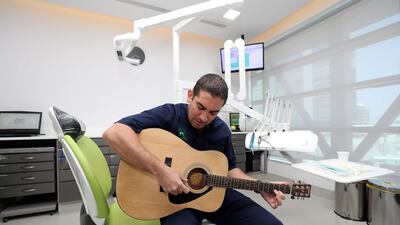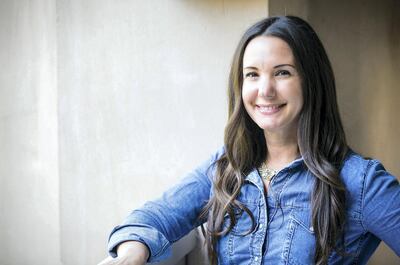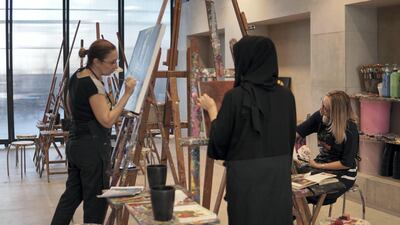A happily married father-of-three, with his own dental practice in Abu Dhabi, Tarek Al Khatib can certainly be described as an accomplished man. And yet, for the past 20 years, Al Khatib says there’s been one thing he’s wanted to do, but never could or did until he turned 40.
All that changed a few months ago, after a discussion with his wife over lunch. Al Khatib went straight from his clinic to a music shop and bought a Yamaha acoustic guitar. He paid Dh200 for lessons through online platform Udemy and has been practising ever since.
“I kept on thinking about it all through the years, but I never got the chance,” says Al Khatib. “And then I got married and I had kids. [Finally] it got to the point where I thought: ‘I now have a little bit of time for me.’”
He’s not alone. After building a career, and perhaps starting a family, people in their 40s, 50s and beyond can feel in need of a challenge or just want to learn or take up something that’s a bit different, even if they already have highly successful careers.
Talk-show host Busy Philipps took up tennis; actress Jada Pinkett Smith launched a Facebook Live show, while her rapper husband, Will, started Just Water, an eco-friendly company with their son, Jaden; even Kim Kardashian recently revealed that she was studying to become a lawyer.
Think of it as a mini version of the hero's journey, that archetypal narrative pattern described by Joseph Campbell in his 1949 work The Hero with a Thousand Faces.
Played out in myriad stories from page to screen to podcast, both serious and silly, the hero’s journey calls upon an individual to do something that requires leaving all that’s familiar and comfortable. After struggling through a crisis or “dark night of the soul”, he or she emerges transformed – and happier for it.
In real life, heroes may only answer the call to learn the cross-stitch or play the violin, but they still glean the significant benefits that come from trying something new. “I think when people are just settled into their routine of sleep, eat, work and home, that’s boring,” says Heidi Elmaarouf, a life coach and reiki practitioner in Abu Dhabi. “We’re meant to learn, to use our brain. Routine is good, but throw in that extra course or sport or instrument or language – learning it will keep you fresh.”
Whatever you challenge yourself to do, the results are worth the time invested, says Elmaarouf. “Focus on something you really want, [even if it’s] in your downtime or on your days off,” she says. “And become happier.”
By definition, a challenge is not always simple or easy, as Katherine Raso, 44, a partner in Dubai firm Copia Group, found when she decided to go back to piano lessons decades after reaching the Grade 8 level with the Royal Conservatory of Music.
She describes her path as lined with fear and frustration. “I wanted to be at the point where I was before, when I could look at any piece of music and play it. But the road ahead required me to learn the piano all over again.
"There was fear. 'Oh, my god, what if I can't do this? I did it when I was younger, but how do I know if I can do it again?' Fear to the point that I cancelled my first lesson because I was like: 'This is way too much to take on.'" Raso rescheduled that first class, persisted in her piano lessons and is now relearning an old skill in a new way. "The goal is not about being a concert pianist, and I think that's what has changed [since I was] a kid," she says. "Now it's just for me. I want to reach the point where it's a relaxing hobby."
That sense of fear and doubt is something Camille Despalle de Bearn sees regularly at the start of thejamjar’s art sessions for adults. “They are really scared that they are going to be in a class where everybody else knows more, or are more advanced, and that’s going to be a problem,” says the studio and programme manager for the community arts space in Dubai’s Alserkal Avenue. The spectre of past failures seems to loom large for adults, a worry that eager children learning an unfamiliar skill or attending a new class haven’t yet encountered, she says. Many don’t believe they are creative and, despite all they have accomplished in their lives, are not confident they are capable of learning something new.
“Usually, the first reaction is self-doubt: ‘I have no skills, I won’t be able to learn it,’” she says. “And it can take a lot of reassurance to communicate to someone that ‘you will be able to learn it because we are able to learn anything’.”
Of course, the right fit is important when looking for a new activity or challenge. Karly Melnyk, 36, is a Canadian health and wellness advocate, yoga teacher and fitness trainer from Abu Dhabi, who was looking to incorporate more movement into her regime.
She tried both tennis and squash before finding padel tennis on social media, and started taking lessons at Abu Dhabi Country Club. This sport uses a light racquet and is played in doubles on a smaller walled court. “When I found padel tennis, I knew this is just the right size,” she says. “It is a combination between tennis and squash, and for me it was the perfect medium. It does push you out of your comfort zone, but when that happens there’s room for growth.”
Circling back to Al Khatib, he says he's experiencing the satisfaction that comes with finally doing something you've long wanted. "When you think about something for over 20 years, and when you keep on thinking about it, and when you see it on TV or you go to a concert, and it's always in the back of your head … you do owe it to yourself to at least try." An Ed Sheeran fan who plans to make Photograph the first song he can play on guitar, this dentist isn't dreaming of entertaining thousands of fans.
What Al Khatib wants is a lot more modest, wholly achievable and just as meaningful: “If we are going out with some friends, or to their house for dinner, and they say: ‘Hey, grab the guitar and play some songs for us’ – I want to be able to sit there and do that.”



